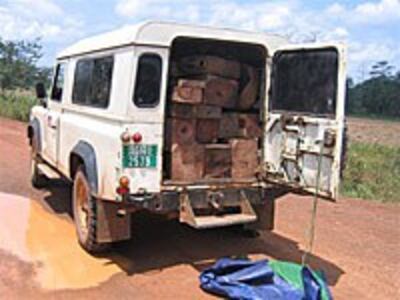
PHNOM PENH—The unidentified driver of an SUV filled with cut timber tried to run down a Radio Free Asia (RFA) reporter in northeastern Cambodia as he photographed a small illegal logging operation.
Sok Ratha was taking photos in Rattanakiri Province early Oct. 1 as a police officer and five villagers tried to stop a small logging operation carried out by three men in civilian clothing.
Sok Ratha photographed a sport utility vehicle (SUV) loaded with logs. One man wore a civilian shirt with military-issue trousers.
The driver of the SUV steered his vehicle at Sok Ratha and drove toward him. Sok Ratha dodged the vehicle but lost his footing and grabbed onto on open window to avoid falling beneath it.
The SUV then dragged him for approximately 100 meters, his right foot on the running board and left foot on the ground, before he was able to break away.
“He was trying to hit me, or he would have stopped,” Sok Ratha said.
Two motorcycle drivers then drove past Sok Ratha, with one firing shots into the air from a handgun, he said.
Sok Ratha suffered injuries to his legs and one ankle but reported that he was otherwise unharmed. Police at another location said they later confiscated two vehicles and logs and arrested two of the loggers.
The men arrested linked the logging to Cambodia’s co-defense minister and deputy premier, Army Gen. Tea Banh, sources said. Tea Banh, contacted by RFA’s Khmer service, denied any involvement in the operation.
Illegal logging widespread
Cambodians report that numerous small illegal logging operations are occurring all over northeastern Cambodia. Most of the logs are believed to be heading to Vietnam.
According to the United Nations Food and Agriculture Organisation (FAO), three-quarters of Cambodian territory was covered in forest in 1990—but half of it had been harvested by 2000.
Forest products remain a major source of income for the country, 85 percent of whose people earn a living from agriculture and forestry.
Peter Leuprecht, Special Representative for the UN Secretary General, predicted “a human and ecological tragedy if the logging continued.
“What we are seeing is the rapid destruction of the Cambodian forests, and the destruction of the future for generations of people who are mainly subsistence farmers,” he said.
In November 2004, the nonprofit group Global Witness published a report alleging that in Cambodia’s timber business “corruption is so entrenched that almost everyone, in a position to do so, appears to be taking their cut. The costs of weak forest sector governance, in terms of lost revenues, destruction of rural livelihoods, and environmental damage continue to mount.”
“Name any law enforcement agency or department of government, from the Forest Administration to the Royal Cambodian Armed Forces, from the Police to Military Intelligence, even Unit B-70 the Prime Minister's body guards, are involved in the destruction of the Aural Wildlife Sanctuary," Global Witness spokesman Jon Buckrell said.
